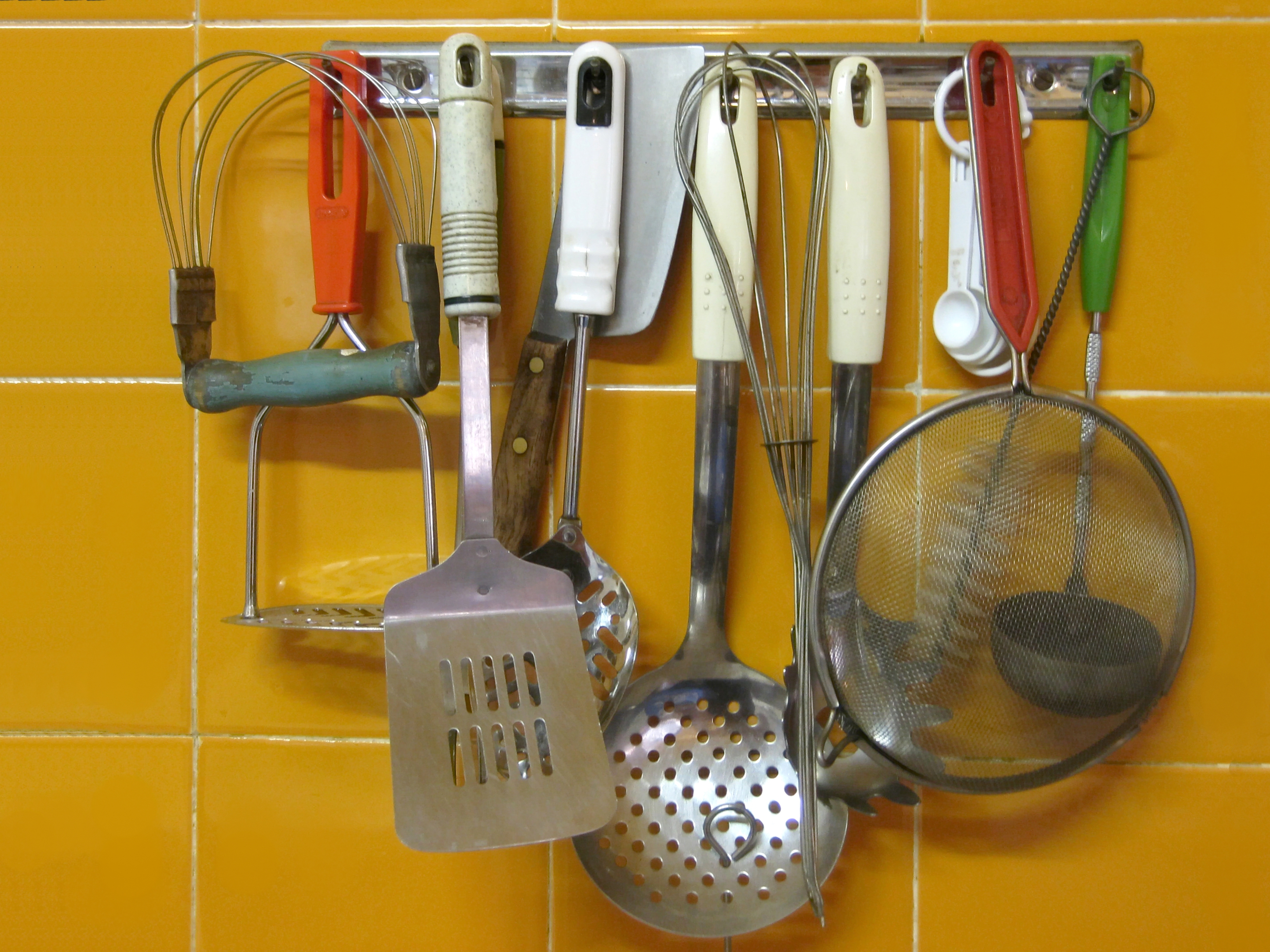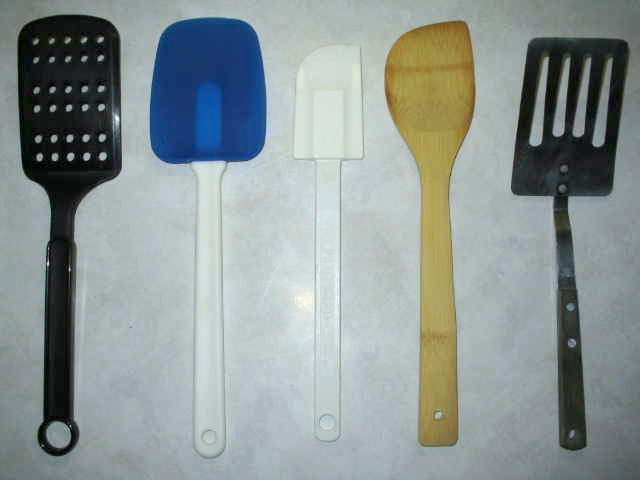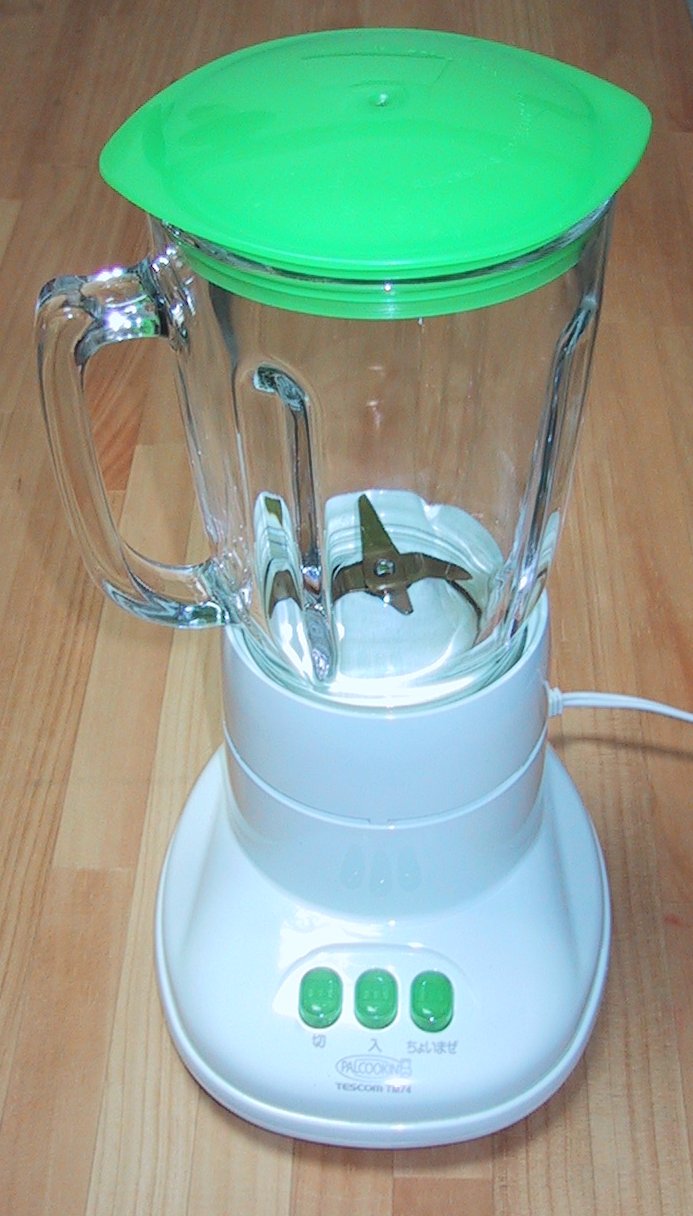|
Electric Mixer
A mixer, depending on the type, also called a hand mixer or stand mixer, is a kitchen device that uses a gear-driven mechanism to rotate a set of "beaters" in a bowl containing the food or liquids to be prepared by mixing them. Mixers help automate the repetitive tasks of stirring, whisking or beating. When the beaters are replaced by a ''dough hook'', a mixer may also be used to knead. A mixer may be a handheld mechanism known as an eggbeater, a handheld motorized beater, or a drill mixer. Stand mixers vary in size from small counter top models for home use to large capacity commercial machines. Stand mixers create the mixing action by either rotating the mixing device vertically (planetary mixers), or by rotating the mixing container (spiral mixers). History The mixer with rotating parts was patented in 1856 by Baltimore, Maryland, tinner Ralph Collier. This was followed by E.P. Griffith's whisk patented in England in 1857. Another hand-turned rotary egg beater was paten ... [...More Info...] [...Related Items...] OR: [Wikipedia] [Google] [Baidu] |
Tinsmith
A tinsmith is a person who makes and repairs things made of tin or other light metals. The profession may sometimes also be known as a tinner, tinker, tinman, or tinplate worker; whitesmith may also refer to this profession, though the same word may also refer to an unrelated specialty of iron-smithing. By extension it can also refer to the person who deals in tinware, or tin plate. Tinsmith was a common occupation in pre-industrial times. Unlike blacksmiths (who work mostly with hot metals), tinsmiths do the majority of their work on cold metal (although they might use a hearth to heat and help shape their raw materials). Tinsmiths fabricate items such as water pitchers, forks, spoons, and candle holders. Training of tinsmiths The tinsmith learned his trade, like many other artisans, by serving an apprenticeship of 4 to 6 years with a master tinsmith. Apprenticeships were considered "indentures" and an apprentice would start first with simply cleaning the shop, polishing t ... [...More Info...] [...Related Items...] OR: [Wikipedia] [Google] [Baidu] |
Knead
In cooking (and more specifically baking), kneading is a process in the making of bread or dough, used to mix the ingredients and add strength to the final product. Its importance lies in the mixing of flour with water; when these two ingredients are combined and kneaded, the gliadin and glutenin proteins in the flour expand and form strands of gluten, which gives bread its texture. (To aid gluten production, many recipes use bread flour, which is higher in protein than all-purpose flour.) The kneading process warms and stretches these gluten strands, eventually creating a springy and elastic dough. If bread dough is not kneaded enough, it will not be able to hold the tiny pockets of gas (carbon dioxide) created by the leavening agent (such as yeast or baking powder), and will collapse, leaving a heavy and dense loaf. Kneading can be performed by hand (the traditional way), with a mixer equipped with a dough hook, or with a bread machine. In hand kneading, the dough is put o ... [...More Info...] [...Related Items...] OR: [Wikipedia] [Google] [Baidu] |
American Inventions ...
The following articles cover the timeline of United States inventions: *Timeline of United States inventions (before 1890), before the turn of the century * Timeline of United States inventions (1890–1945), before World War II *Timeline of United States inventions (1946–1991), for the post-war era *Timeline of United States inventions (after 1991), after the Fall of the Soviet Union {{DEFAULTSORT:Timeline of United States Inventions United States inventions United States The United States of America (U.S.A. or USA), commonly known as the United States (U.S. or US) or America, is a country primarily located in North America. It consists of 50 states, a federal district, five major unincorporated territorie ... [...More Info...] [...Related Items...] OR: [Wikipedia] [Google] [Baidu] |
1870 Introductions
Year 187 ( CLXXXVII) was a common year starting on Sunday (link will display the full calendar) of the Julian calendar. At the time, it was known as the Year of the Consulship of Quintius and Aelianus (or, less frequently, year 940 ''Ab urbe condita''). The denomination 187 for this year has been used since the early medieval period, when the Anno Domini calendar era became the prevalent method in Europe for naming years. Events By place Roman Empire * Septimius Severus marries Julia Domna (age 17), a Syrian princess, at Lugdunum (modern-day Lyon). She is the youngest daughter of high-priest Julius Bassianus – a descendant of the Royal House of Emesa. Her elder sister is Julia Maesa. * Clodius Albinus defeats the Chatti, a highly organized German tribe that controlled the area that includes the Black Forest. By topic Religion * Olympianus succeeds Pertinax as bishop of Byzantium (until 198). Births * Cao Pi, Chinese emperor of the Cao Wei state (d. 226) * Gu ... [...More Info...] [...Related Items...] OR: [Wikipedia] [Google] [Baidu] |
Food Preparation Utensils
A kitchen utensil is a hand-held, typically small tool that is designed for food-related functions. Food preparation utensils are a specific type of kitchen utensil, designed for use in the preparation of food. Some utensils are both food preparation utensils and eating utensils; for instance some implements of cutlery – especially knives – can be used for both food preparation in a kitchen and as eating utensils when dining (though most types of knives used in kitchens are unsuitable for use on the dining table). In the Western world, utensil invention accelerated in the 19th and 20th centuries. It was fuelled in part by the emergence of technologies such as the kitchen stove and refrigerator, but also by a desire to save time in the kitchen, in response to the demands of modern lifestyles. [...More Info...] [...Related Items...] OR: [Wikipedia] [Google] [Baidu] |
Kitchenware
:'' For a record label, see Kitchenware Records'' Kitchenware are the tools, utensils, appliances, dishes, and cookware used in food preparation, or the serving of food. Kitchenware can also be used in order to hold or store food before or after preparation. Types Kitchenware encompasses a wide range of tools. Some of the most common items of kitchenware are: See also * Batterie de cuisine * Cookware and bakeware * Gastronorm, a European size standard for kitchenware * List of cooking vessels * List of eating utensils * List of food preparation utensils * List of glassware * List of Japanese cooking utensils * List of serving utensils * List of types of spoons * NSF International, formerly "National Sanitation Foundation" * Tableware Tableware is any dish or dishware used for setting a table, serving food, and dining. It includes cutlery, List of glassware, glassware, serving dishes, and other items for practical as well as decorative purposes. The quality, nature ... [...More Info...] [...Related Items...] OR: [Wikipedia] [Google] [Baidu] |
Electrolux Ankarsrum Assistent
:''The original that this article was based upon can be seen at :sv:Electrolux Assistent in the Swedish Wikipedia.'' Assistent is a household kitchen appliance, introduced by Electrolux in 1940. The distinctive feature of this mixer is that it spins the bowl and its contents, not the stirring paddle. As a result, there is more torque and less noise. The bowl is driven by an electric motor and worm gear from beneath. The power of the motor has increased over time from 250 W through 400 W, 450 W, 650 W, 800 W and now 1500 W. Original machines had a simple single speed switch; modern machines have both variable speed and a timer. History It was designed by Alvar Lenning and became a bestseller for Electrolux. Until 1962, the Assistent was produced at Lilla Essingen in Stockholm, when the production line was then moved to Motala. Since 1969, the Assistent has been produced in Ankarsrum when Electrolux acquired the metallurgy firm ''Ankarsrums b ... [...More Info...] [...Related Items...] OR: [Wikipedia] [Google] [Baidu] |
Kenwood Chef
The Kenwood Chef is a food mixer developed by Ken Wood in Britain. It is a single machine with a number of attachments that allow it to perform many functions. The Chef, based on the earlier A200, was introduced in 1950. Kenwood mixers, along with most other Kenwood products were originally manufactured in the UK by Kenwood Limited (not to be confused with the Japanese Kenwood Corporation which manufactures audio equipment). The Chef Mixer was an instant success in the UK and is still Kenwood's top seller . Overview Ken Wood began trading as Woodlau Industries Ltd in 1947. His aim was to produce luxury items that would quickly be seen as necessities. He began marketing a toaster and a food mixer with two beaters. The original mixer marketed as "The Kenwood Electric Food Mixer", designed in 1947 was very similar (possibly too similar) to the Sunbeam Mixmaster Model 3, an American mixer made between 1936 and 1939, and he faced serious competition and possibly objection. He com ... [...More Info...] [...Related Items...] OR: [Wikipedia] [Google] [Baidu] |
Pastry Blender
A pastry blender is a cooking utensil used to mix a hard (solid) fat into flour in order to make pastries. The tool is usually made of narrow metal strips or wires attached to a handle, and is used by pressing down on the items to be mixed (known as "cutting in"). It is also used to break these fats (shortening, butter, lard) into smaller pieces. The blending of fat into flour at this stage impacts the amount of water that will be needed to bind the pastry into a dough. See also *Dough scraper *Dough blender *Whisk A whisk is a cooking utensil which can be used to blend ingredients smooth or to incorporate air into a mixture, in a process known as '' whisking'' or ''whipping''. Most whisks consist of a long, narrow handle with a series of wire loops joi ... References Food preparation utensils {{Kitchenware-stub ... [...More Info...] [...Related Items...] OR: [Wikipedia] [Google] [Baidu] |
Dough Scraper
A kitchen scraper is a kitchen implement made of metal, plastics (such as polyethylene, nylon, or polypropylene), wood, rubber or silicone rubber. In practice, one type of scraper is often interchanged with another or with a spatula (thus scrapers are often called ''spatulas'') for some of the various uses. Types Bowl Bowl scrapers (also known as rubber feet) are, as the name suggests, used to remove material from mixing bowls. Often, a plate scraper is used for this purpose, particularly since the long handle allows it to be used to remove contents of bowls as well as jars, such as mayonnaise jars; however, for bowls, dedicated scrapers are available, lacking the handle, and consisting of a flat, flexible piece of plastic or silicone rubber sized for convenient holding with the palm and fingers, with a curved edge to match the curvature of the average bowl. The degree of curvature can vary from a slight curvature along one edge of a rectangle, to a complex shape composed of ch ... [...More Info...] [...Related Items...] OR: [Wikipedia] [Google] [Baidu] |
Milkshake Machine
A milkshake machine or drink mixer is a kind of countertop electric mixer used to make milkshakes, flavored milk, frappés, and other blended beverages. Milkshake machines are generally used in ice cream stores and fast food restaurants, and are not common as domestic appliances, where blenders are typically used instead. Overview A milkshake machine consists of a stand for an electric motor and a removable cup, a "malt cup". The motor is connected to a vertical rod at the bottom of which is an small agitator of wavy metal or plastic. The cup is placed so that the agitator is submerged, and sits on the floor of the stand, or on a small bracket. The malt cup is a flared cup, usually of stainless steel. History Manual, crank-driven milkshake machines were introduced by James Tufts in 1884, under the name Lightning Shaker. The modern top-driven electric milkshake machine was invented by Frederick J. Osius in 1910, and commercialized by his Hamilton Beach company under the name C ... [...More Info...] [...Related Items...] OR: [Wikipedia] [Google] [Baidu] |
Blender
A blender (sometimes called a mixer or liquidiser in British English) is a kitchen appliance, kitchen and laboratory appliance used to mix, crush, purée or emulsion, emulsify food and other substances. A stationary blender consists of a blender container with a rotating metal blade at the bottom, powered by an electric motor that is in the base. Some powerful models can also crush ice and other frozen foods. The newer immersion blender configuration has a motor on top connected by a shaft to a rotating blade at the bottom, which can be used with any container. Characteristics Different blenders have different functions and features but product testing indicates that many blenders, even the less expensive ones, are useful for meeting many consumer needs. Features which consumers consider when purchasing a blender include the following: *large visible measurement marks *ease of use *low noise during usage *power usage (typically 300–1000 watts) *ease of cleaning *option for quic ... [...More Info...] [...Related Items...] OR: [Wikipedia] [Google] [Baidu] |








